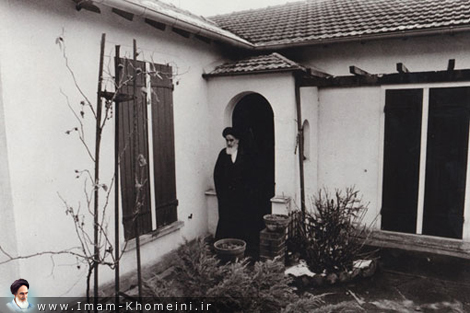- News code: 1237991
- Source: en.imam-khomeini.ir
On the 4th of October 1978, the Iraqi government forced Imam Khomeini to leave Iraq for Kuwait. However the Kuwaiti government did not give refuge to Imam Khomeini due to the Iranian regime's request. Consequently, Imam Khomeini flew to Paris.
The Imam himself explains this event: "They (the Iraqi government) said that: 'due to the fact that we have certain agreements with the Iranian government and the actions of you and your companions do not observe these agreements, we can no longer have you here.' I answered that you have made agreements, I haven't. I have a religious duty, which I will carry out, and I will pay no attention to your agreements. I will preach on the Manbar [1] issue statements and make recordings on tapes and send them. This is my duty. Whatever duty you have, carry it out… I then got ready to leave… under strict Iraqi supervision I went to the Kuwaiti border and the same pressure that was put on the Iraqi government was also put on the Kuwaiti government (and so refuge was not given to the Imam)…from there we returned to Basra and then we went to Baghdad. I realized that whichever Muslim country we go to it will be the same. It was for this reason that, without any previous thought on the matter, I decided to go to France."
During this time, the Shah found himself in a crucial situation where the foundations of the regime were very shaky. He tried to carry out various different measures but they were not successful and angered the people even more. For instance he made it the responsibility of different prime ministers to supposedly change the government. News of the people's anger and of an upcoming revolution spread throughout the world and grabbed Media attention.
On 12th of October 1978 Imam Khomeini said the following to a BBC reporter: "This regime must be overthrown and then…When the parliament is sworn in people's opinion should play the main role." On other occasions, Imam Khomeini explained what he intended to do after the downfall of the Shah's regime.
Replying to one of the Iranian politicians, who claimed that the Imam had endured great difficulties and this revolution or rise was more personal rather than for the people, the Imam said: "I have not been tortured….. So my opposition to this man (Shah) is not due to me being tortured…My suffering is the suffering of this nation. When I remember the faces of people who have lost their children and sons, I am tortured… What tortures me is the tragedy that has consumed this nation. "
The Revolutionary Council
One of the most important decisions made by Imam Khomeini in Paris was deciding to form a revolutionary council. The events in the autumn of 1978 made Imam Khomeini think of changing the regime. Thus on the 11th of November 1978, he assigned the job, of finding suitable and good people to make up the revolutionary council, to Ayatollah Beheshti and Ayatollah Mottahari.
According to the Imam's words, he worked more than sixteen hours a day. He did interviews, gave speeches, read reports, analysed letters and telegraphs and replied to them. The first apparent outcome of the Imam's resistance and permanence was made clear to the world on January the 3rd 1979. On that day the Shah left Iran for an unknown destination. This shocked the world and the Iranian nation were one step closer to victory.
At 20:30 on the same day, the Imam issued a short statement informing the people of three important points:
1- The Shah's exit from Iran is the first step in ending the domination of criminals. It means the end of many years of rule by the Pahlavi regime ... This is due to the heroic campaigns of the Iranian nation. I congratulate this first phase of victory and I will issue a statement regarding it.
2- Soon we will introduce a temporary transitional government in order to carry out parliamentary elections and approve the constitutional laws.
3- I will return to Iran at the first suitable opportunity."
- The Imam's Background
- The childhood period
- Immigration to Arak
- Immigration to Qom
- Marital life
- Imam from 1941-1961
- The start of political confrontations
- The attack on Faydhiah School
- Exile to Turkey
- Exile to Iraq
- Exile to Paris
- Return to Tehran
- Visiting the holy city of Qom
- Establishment of an Islamic Republic
- Residence in Tehran
- Death (1989)

